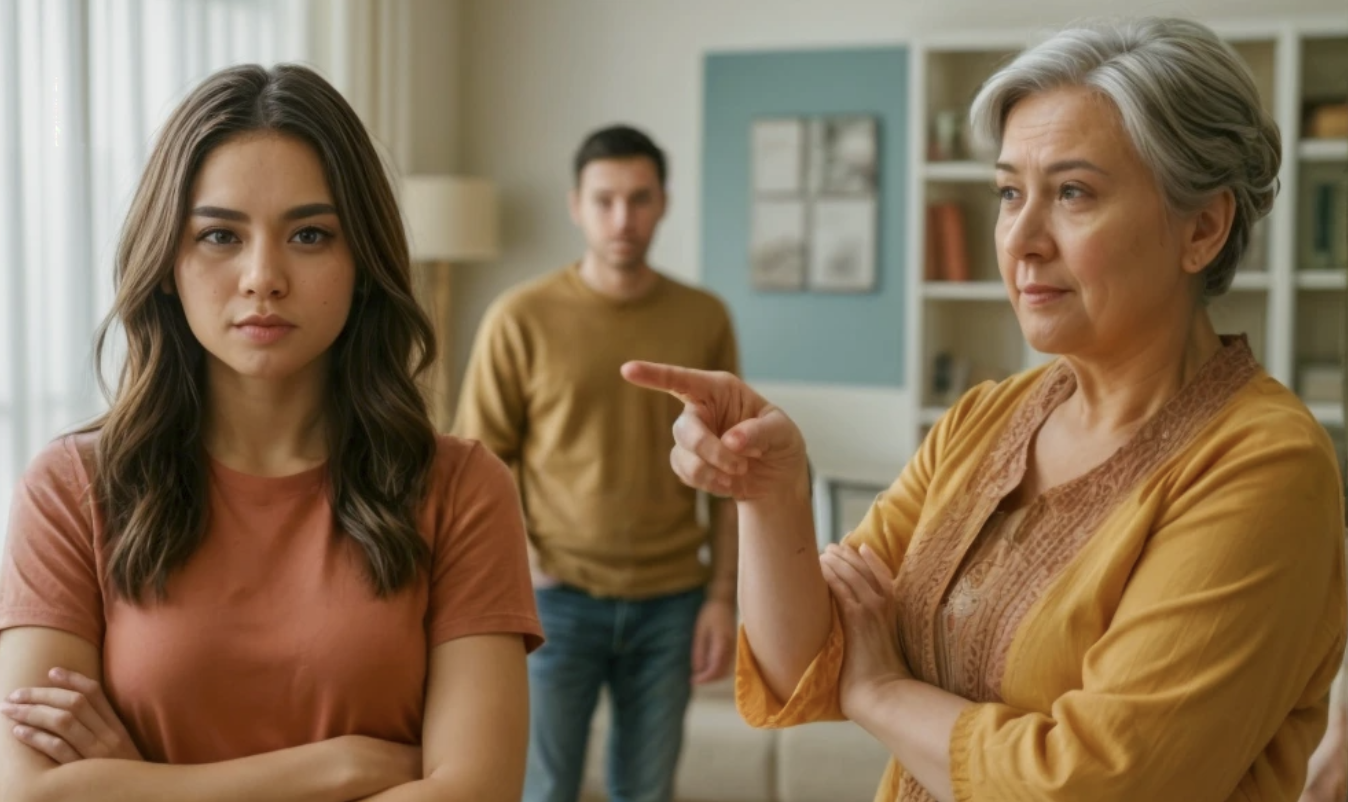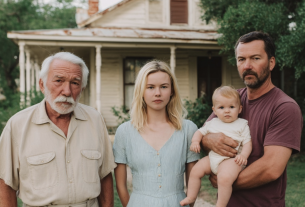Polina woke up ten minutes before the alarm. As always on this day. Sleep slipped away quietly, without any scene—like someone who knows they weren’t especially awaited here. Not anxiety, not joy, just that feeling—as if somewhere inside you’ve been keeping a calendar for a long time. Where, drop by drop, tiredness and resentment and all that other stuff accumulates… you can’t quite put it into words, but you still have to live with it.
A crack stared down at her from the ceiling. New. Or had she just not noticed it before?
“Happy birthday, Polina Sergeyevna…” she whispered to herself and slowly sat up, as if she weren’t getting out of bed but hoisting an entire era from it.
Something was already sizzling in the kitchen. Ruslan, in a stretched-out T-shirt and house pants, was stirring scrambled eggs, muttering under his breath. In the corner the TV was singing—cheerfully reporting the weather, as if anyone still cared about the weather.
“We’re out of eggs,” Ruslan grunted without looking.
“I hope you mean in the fridge, not us,” Polina answered and hit the kettle. It groaned like an old bus making a U-turn.
“Uh-huh. Though at my mom’s, she probably always has everything,” he smirked. It sounded offhand, but they had a whole language of this—half-hints, habitual jabs, and the eternal “Mom this, Mom that.”
Polina kept quiet. After years of marriage she knew: if you start talking in the morning, you might not stop until night.
Breakfast passed to the scrape of a fork and the voice of a weather man who was probably paid for optimism.
Lidiya Petrovna arrived at exactly noon. To the minute. She didn’t come in like a guest—like an inspector. Without taking off her shoes, she surveyed the living room with the look of someone who’s been awaited here with a bowed head.
“What kind of renovations do you have going on?” she drawled, pointing at the wall. “The wallpaper—like from a clearance sale for the blind.”
“Good afternoon, Lidiya Petrovna,” Polina exhaled and took her coat. The manicure was duly noticed and mentally filed in the folder marked “violations.”
“Ruslan! Get over here and help your mother! I hauled these cakes from the bus stop! My arms are falling off!”
Ruslan jumped up, and Polina stayed in the hallway with her coat. She suddenly thought—what if I just drop it on the floor right now? What would happen?
Nothing would happen. The coat would survive. Even without a hanger.
Salads already stood on the table, two “shubas” (layered herring salads), three cakes. One—store-bought, one—hers, her “signature.” And the third—Polina’s. The very one from childhood, with boiled condensed milk, the one she made for herself every year. As if to remind herself: if no one congratulates you, at least don’t forget yourself.
“Well, let’s get to it before everything gets cold,” Lidiya Petrovna said briskly, taking the head of the table.
“You’re, as always, at the center of things,” Polina said, pouring the glasses.
“But of course! Someone has to keep you all in shape around here,” the mother-in-law snorted and, winking at her son, added, “Ruslan, a toast!”
Ruslan delivered a toast like a feverish child: unsure, rambling, a little about everyone. Nothing to fault, nothing to remember.
By the second glass, Lidiya Petrovna had hit her stride:
“Polina, what is that arrangement in your bedroom? The bed right by the window—aren’t you afraid of drafts? Who thought that up?”
“We did. It’s our bedroom.”
“Are you sure you can call it that? ‘Our’?” Her voice was soft, but in that softness was the whole point: a tightening noose.
Polina set down her fork.
“This is Ruslan’s apartment. He inherited it from his father. I, you know, at the time ran around to all the offices with him…”
“Ran around, sure. Mostly—to the notary and back,” Polina said quietly.
“I didn’t ask you to interrupt me!” Lidiya Petrovna raised her voice. “Maybe I’d be more comfortable in the bedroom. My legs, my blood pressure. And you can put yourselves on the sofa.”
“You’re proposing I give you the bedroom?” Polina asked. Ruslan, in that moment, turned into a child listening to his parents start to fight.
“Not yours. Ruslan’s. Who are you here? A wife is a passing thing. A mother is forever.”
Silence descended on the room—so dense even the cake froze.
An hour later the apartment smelled not of food—but of irritation. Lidiya Petrovna had stretched out on the sofa, took the remote, and, playing the kindly old lady from the movies, said:
“Oh, my blood pressure. I could use some rest. In silence. Polina, your kitchen is dirty, by the way.”
Polina turned to her the way you turn not to a person—but to an event.
“You know, Lidiya Petrovna. It’s my birthday today. And I decided to give myself a gift.”
“Oh, finally a proper toast!”
“The gift is silence. Freedom. And your absence.”
Ruslan stood up. A little baggie with leftovers almost slid off the edge of the table.
“Polin, wait. She… well, you know…”
“Ruslan. Either you start packing her things. Or yours. I’m not joking.”
“This is my home! My father left it to me!”
“Then live here with the people who left it to you. Right along with the square meters.”
Silence. Even the TV paused.
“You ungrateful thing! I gave my life to this! And you—throw me out!”
“I work. I know what my life costs. You don’t. Everything fell into your lap.”
Slowly, Lidiya Petrovna got up. She looked toward the bedroom.
“I’ll be back tomorrow. With documents. We’ll see who lives here.”
“Come with a prosecutor for all I care,” Polina tossed back. “Ruslan, are you with her—or with me?”
He was silent. Stared at the floor. The very floor they had sanded together once, arguing about where the wardrobe should go.
Late that evening Polina sat alone. In front of her—a candle. Already snuffed out. She hadn’t had time to make a wish.
In the morning she sat at the public services center. Papers stacked in her hands. A hum in her head like before an exam—only this exam was for life.
“Maybe it would’ve been easier to forgive? Forget? Just breathe out already…” suggested the part of her that feared change.
“Forgave. Fifteen times. Forget? Only if they knock my head off,” answered the other part. The one that had already chosen.
A slip from the housing office fluttered out and blew onto the street.
“Hey, girl, your paper!”
“Thanks. I’m just here to register a new life,” Polina threw over her shoulder and walked on.
In the evening Ruslan came back. With a bag. Inside—curd bars.
“Your favorite. Those. With chocolate.”
“I’m not senile. And you’ve evolved into some new species—man leaves, then brings sweets to the person he left.”
“I talked to Mom. She just… well, you know. Her blood pressure.”
“And my pressure is from your silence. You’ve been silent your whole life. Even when your mother is already knocking down our walls in her head.”
“About the walls… Listen… I wanted to tell you. The apartment—it’s not exactly mine. Half of it is Mom’s. That’s how we registered it. When Dad died. So we wouldn’t have to split it with my brother…”
“Wait. Say that again.”
“Well… yeah. She’s a half-owner.”
Polina stood up. Slowly. Like someone who doesn’t just need to leave—but to walk out of herself.
“I see. Thank you. Now everything falls into place.”
Polina exhaled like someone having a cast removed after a fracture—only no one remembered to say you have to learn how to walk all over again.
“Wonderful. So I lived here with you, invested, dragged all this on my back, picked out the furniture, the washer—remember, I paid for it myself? And you’ve staged a circus for me in someone else’s big top?”
“Polin, you knew… about the money we…”
“I knew you were soft, like thawing lard. But that you were soft and wrapped in your mother’s paperwork—that I didn’t know.”
He shrank, sat on the edge of the sofa as if he wanted to hide inside it.
“What do you want now?”
“A divorce. And my share—through the court. I’ve already seen a lawyer. Don’t interrupt my thoughts; I’ve got everything lined up.”
“Polina… but what about… love?”
“Love, Ruslan, dies the moment your mother walks into my bedroom with a tape measure. And you hold the door for her.”
The next morning—there she was again, on the doorstep, Lidiya Petrovna. Coat flung open, folder in hand, a look like someone who has just been awarded a medal “For Valor on the Kitchen Front.”
“I was at the notary. Half the apartment is mine. And you, dearie, are our guest here. So be so kind—vacate the bedroom for me. My bones aren’t what they used to be; the cot makes my back crunch.”
Polina silently handed her a sheet of paper.
“What’s this now?” She tensed, as if it might be a land mine.
“A statement of claim. I’m demanding compensation—for the renovations, for living expenses, for everything invested. And also—partitioning of shares. You want to play grown-up—fine.”
“You’ve lost your husband; now you’ll lose your roof too! You think the court will side with you?”
“I do. Because the judge isn’t your knitting buddy. And she doesn’t care who promised what to whom over cake.”
“Ruslan!” she shouted, as if about to stab him with the damp folder. “Do you hear this? It’s theft! She’s robbing us!”
He came out of the kitchen. Staring at the floor like a schoolboy with a failing grade.
“Mom… maybe—enough? We’ll go stay with Dimka for a while. And Polina—let her get back what she put in. That’s it. Enough.”
“What?” It was as if Lidiya Petrovna had just heard the central heating had been canceled. “Have you lost your mind?!”
“Enough, Mom. Polina’s right. You crossed a line. It’s her money. Her life. You and I are like cockroaches here: scurrying around, splitting the kitchen, and building illusions.”
Polina stood there as if a tram had run her over. But a warm one.
“So… you’re with me?”
“I’m—with myself. For the first time in my life. I don’t want to be between you anymore.”
Lidiya Petrovna paled. Her hands like an actress’s in the final act.
“You’re betraying me?”
“No. I’m setting us free. You and me. You said, ‘love is temporary, a mother is forever.’ Well, stay with your ‘forever.’ Just without me.”
A week later, they moved out. The mother-in-law’s farewell note remained on the fridge.
“You won. But it won’t bring you happiness. You’re all alone now.”
Polina didn’t even finish reading it. She threw it away.
Alone—but with the bed by the window and no drafts blowing in from other people’s ambitions.
At night she lit a candle. Not for romance—for quiet in her head.
The foster-shelter cat snorted lazily and burrowed into the pillow.
Forty-three. Round two. Let’s go.
Six months later Polina lived alone. Without Ruslan. Without Lidiya Petrovna.
But with normal blood pressure and a wardrobe that didn’t smell of mothballs and spite.
Life hadn’t turned into a fairy tale. But it had become—hers. The coffee now brewed exactly the way she liked it: black as a power outage at night, and bitter as the truth after a family feast.
One day, between the trash bins and the stairwell, a neighbor appeared.
“I’d invite you for coffee… but all I’ve got for dishes right now is the lid from a multicooker.”
“I’ve got glasses and nerves. So come on. You can see what an apartment looks like without senior oversight authorities.”
His name was Ilya. Formerly—an architect. Now—divorced, a mortgage, and a puppy named Pastry Puff.
“It’s cozy here. And quiet,” he said, listening.
“I gnawed this quiet out with my teeth. Through the courts.”
They sat in the kitchen. Pastry Puff had already become part of the rug. The conversation suddenly went deeper than usual.
“Why did you put up with all that? The husband, his mother, the whole mess?”
Polina thought.
“Because I thought—that’s what you do. That being a good wife means you endure. And they never got tired. They were masters of sport at it.”
“And now?”
“Now I don’t care what people think. So long as I can look in the mirror and not wince.”
He raised his glass.
“To mirrors. And to those who look into them honestly.”
A month later Ruslan was at the door again.
“Polin… We need to talk.”
She was washing apples. The T-shirt that read NOT YOUR MOM suddenly felt more apt than ever.
“Talk. There’s just no tea.”
“Mom died.” He said it like announcing the Pyaterochka down the street had closed without warning.
Polina set down the sponge. Sighed.
“I’m sorry. Truly. That’s a loss.”
“I’m splitting the apartment with Dimka now. I thought… Maybe we could start over? Without the past. I’m different now. Honestly.”
She looked at the face she’d known a thousand years. At the hands that never learned to protect. At the shoulders always bent under his mother’s shopping bags.
“You haven’t changed. You’ve just ended up alone. Lonely men are like cockroaches without a kitchen. They run where it’s warm.”
“You’re being unfair.”
“No. I’m being an adult. And I realized: if a person wasn’t with you when things were worse, they have no business being around when things get better.”
“I miss you…”
“And I don’t.”
He left. The door banged.
Pastry Puff barked.
Polina smiled. And—felt no guilt. Only lightness.
Sometimes you don’t need to fix life. You just need to clear it.
A year later she filed the paperwork to register full title to the apartment. Everything that had been—became the past.
The cat slept on the sofa. Pastry Puff—on the rug. Coffee burbled on the stove.
In the doorway—silence.
No hysterics, no shouting, no crumbs of power.
On the wall—a note:
“You won. But alone.”
Polina walked over. Signed beneath:
“Alone—but not a stranger to myself.”


